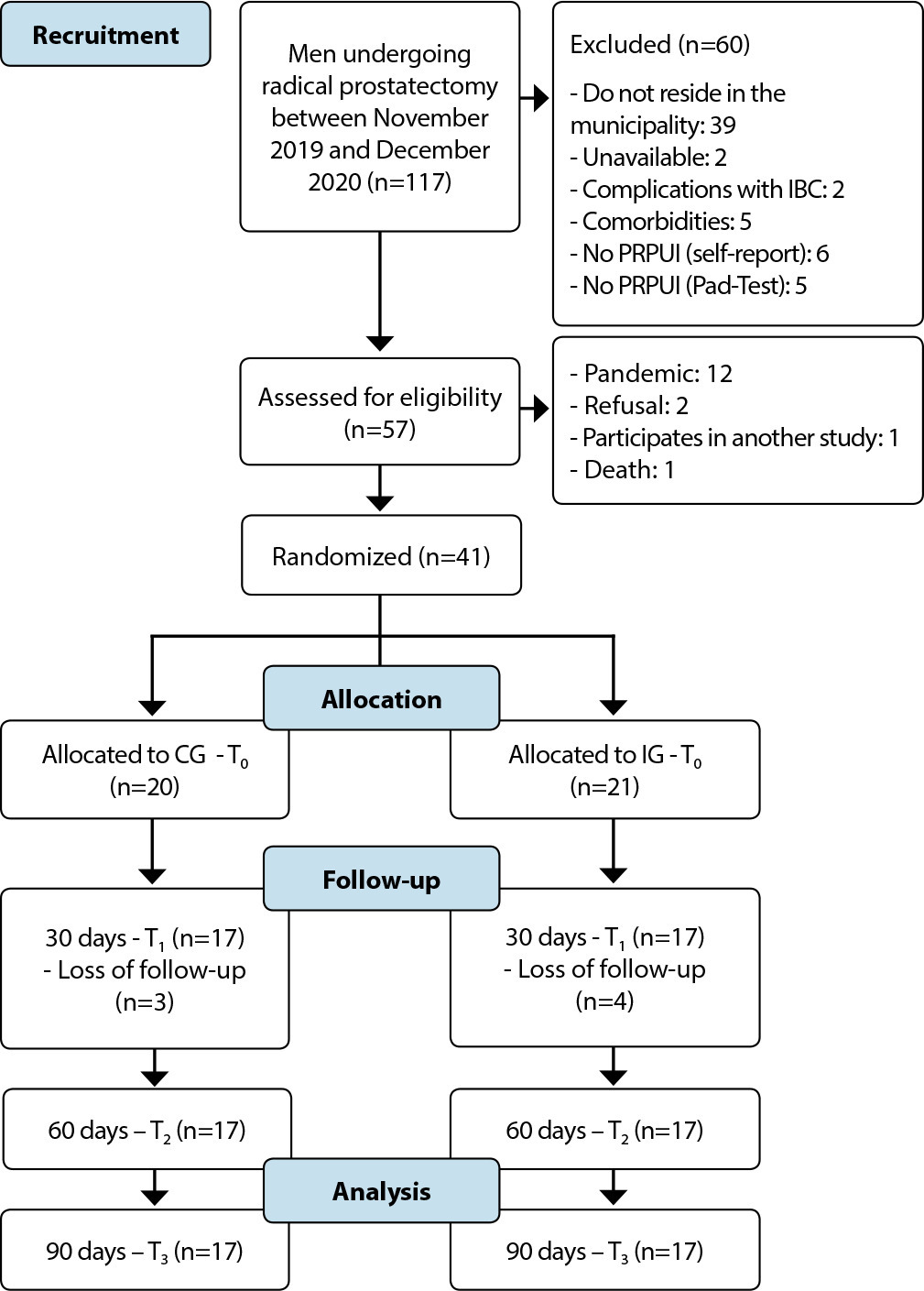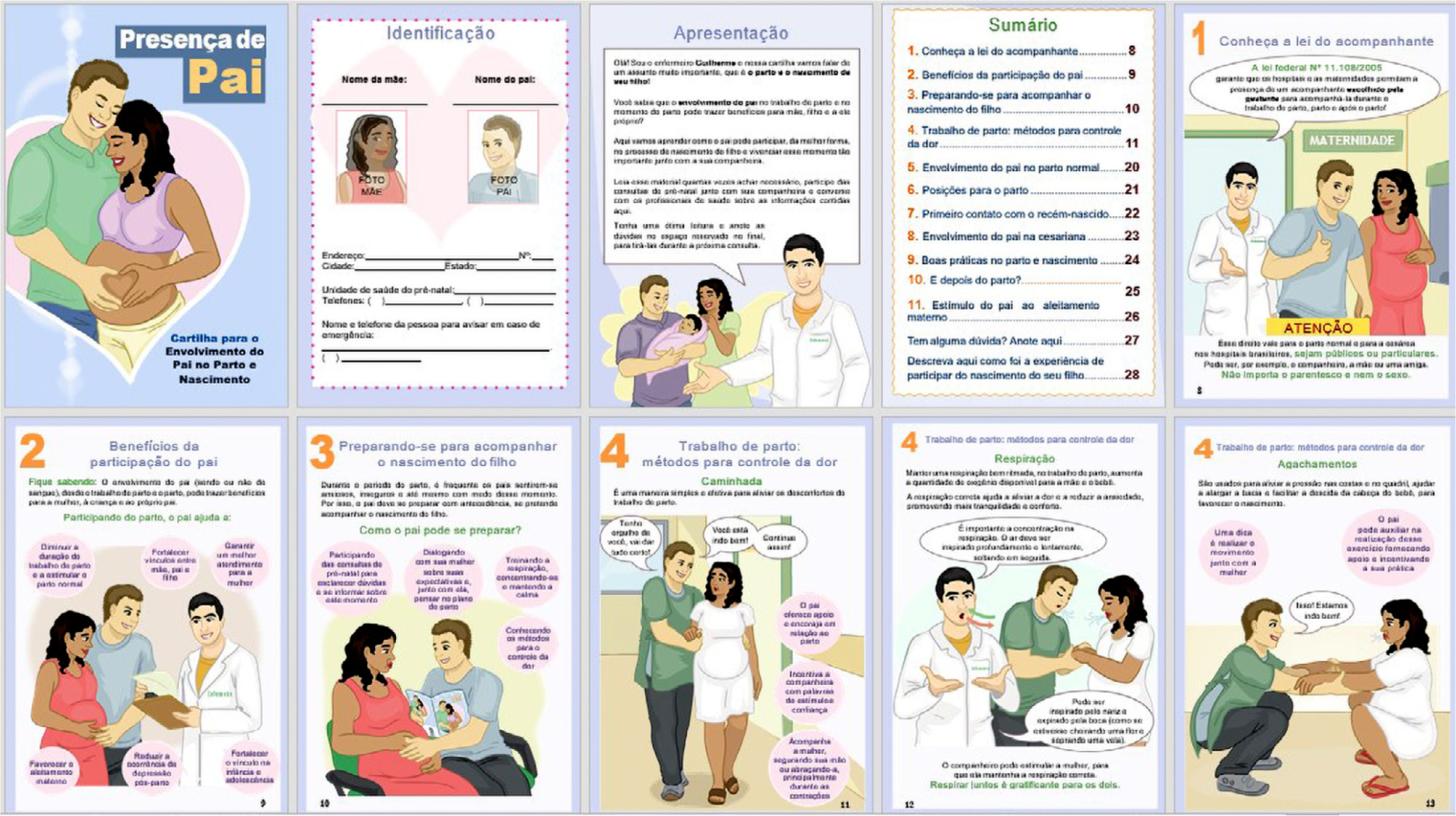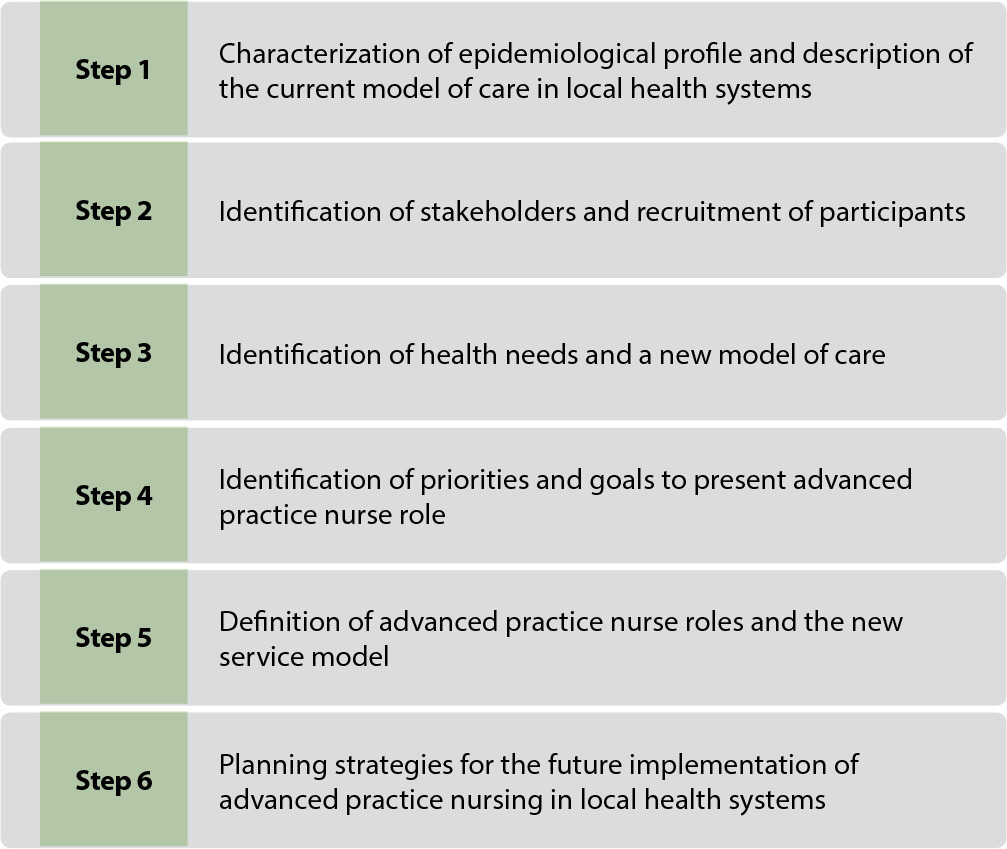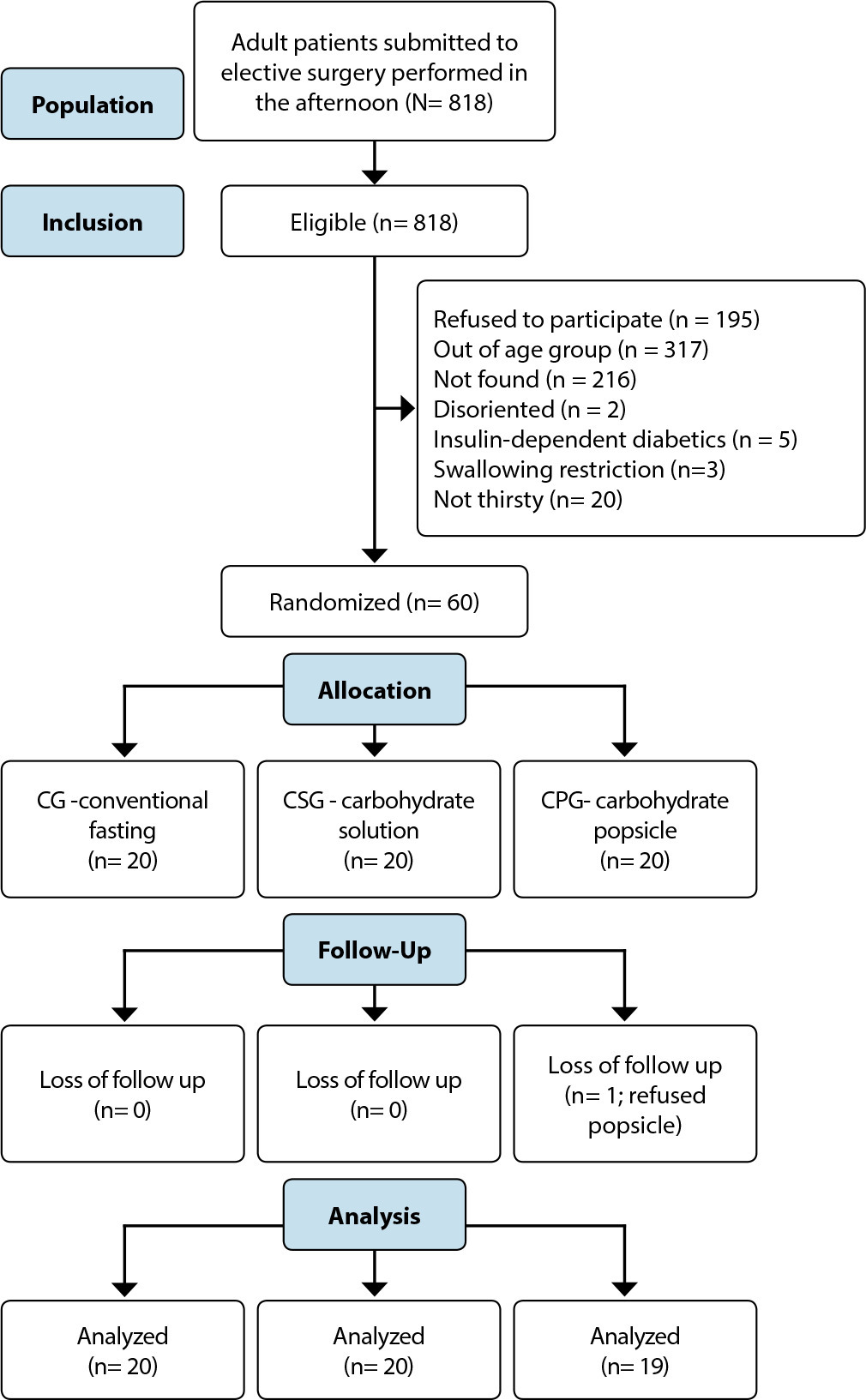-
ORIGINAL ARTICLE07-29-2022
Cognitive-behavioral program to control lower urinary tract symptoms after radical prostatectomy: a randomized clinical trial
Revista Brasileira de Enfermagem. 2022;75(5):e20210818
Abstract
ORIGINAL ARTICLECognitive-behavioral program to control lower urinary tract symptoms after radical prostatectomy: a randomized clinical trial
Revista Brasileira de Enfermagem. 2022;75(5):e20210818
DOI 10.1590/0034-7167-2021-0818
Views0See moreABSTRACT
Objective:
to assess the effectiveness of a cognitive-behavioral program to control lower urinary tract symptoms after radical prostatectomy.
Methods:
a randomized clinical trial study, with 41 participants randomized into intervention (n=20) and control (n=21), for three months. The intervention group received the cognitive-behavioral program, while the control group received routine guidance from the service. Outcome variables were urinary incontinence intensity and lower urinary tract symptoms, assessed by the Pad-Test and Urinary Incontinence Scale of Radical Prostatectomy and King’s Health Questionnaire.
Results:
at the end of the study, the intervention group had a lower urinary incontinence intensity (p≤0.001), and there were less chances of presenting changes in urinary frequency (p≤0.001), urinary urgency (p≤0.001), nocturia (p=0.005), stress urinary incontinence (p≤0.001) and urge incontinence (p≤0.045).
Conclusion:
the cognitive-behavioral program was effective in reducing lower urinary tract symptoms after radical prostatectomy. Brazilian Clinical Trial Registry: RBR-3sstqg.

-
ORIGINAL ARTICLE07-22-2022
Lilalva Scale: soft-hard technology to measure clinical competencies in emergencies of nurses
Revista Brasileira de Enfermagem. 2022;75(5):e20210950
Abstract
ORIGINAL ARTICLELilalva Scale: soft-hard technology to measure clinical competencies in emergencies of nurses
Revista Brasileira de Enfermagem. 2022;75(5):e20210950
DOI 10.1590/0034-7167-2021-0950
Views0See moreABSTRACT
Objectives:
to present the visual identity of a soft-hard technology; to describe its technical characteristics, standardization and norms of criteria for the interpretation of results, in order to measure clinical competencies in emergencies of nurses.
Methods:
article developed as a methodological study for the creation of the graphic image of the scale and standardization based on previous studies of validity and reliability evidence.
Results:
the designed technology was named “Lilalva Scale for Measuring Clinical Competencies in Emergencies of Nurses”. The graphic image text is organized by title, instructions on how to fill it out, description of the quality of delivery, and behavioral actions with respective degrees of response. The Scale has 22 items with characterization data. The standardization of the measurement instrument included: instructions for use, calculation protocol, and hypothetical example to calculate scores, the sum of the resulting scores metric for each clinical competence and diagnostic classification.
Conclusions:
the visual identity and the standardization instrumentalize the use of the Scale for those interested in the theme.

-
ORIGINAL ARTICLE07-22-2022
Educational technology to promote father involvement in childbirth and birth
Revista Brasileira de Enfermagem. 2022;75(5):e20210243
Abstract
ORIGINAL ARTICLEEducational technology to promote father involvement in childbirth and birth
Revista Brasileira de Enfermagem. 2022;75(5):e20210243
DOI 10.1590/0034-7167-2021-0243
Views0See moreABSTRACT
Objectives:
to build and validate an educational booklet to promote the involvement of parents in labor and birth.
Methods:
methodological study developed in five stages: situational diagnosis; bibliographic survey; construction of illustrations, layout, design and texts; content and appearance validation by judges (25 experts) and calculation of the Flesch Readability Index; and validation with the target audience (12 parents). A minimum Content Validity Index of 0.80 was considered.
Results:
the booklet was entitled “Father Presence” and was developed in 11 topics. In Content and Appearance Validation, the Validity Index obtained an overall score of 0.97. Cronbach’s alpha was 0.92, indicating excellent reliability of its content. A global score of 74% for readability was obtained, considered easy to understand.
Conclusions:
the material was successful in the validation process, and it can be recommended for parents to use it during the prenatal period, promoting the inclusion of the partner and preparing them for labor and birth.

-
ORIGINAL ARTICLE07-22-2022
Implementation of advanced practice nursing in Brazilian Primary Health Care: methodological path
Revista Brasileira de Enfermagem. 2022;75(5):e20210614
Abstract
ORIGINAL ARTICLEImplementation of advanced practice nursing in Brazilian Primary Health Care: methodological path
Revista Brasileira de Enfermagem. 2022;75(5):e20210614
DOI 10.1590/0034-7167-2021-0614
Views0See moreABSTRACT
Objectives:
to describe the operationalization of the steps of a model proposed by the Pan American Health Organization for implementing advanced practice nursing in Primary Health Care services.
Methods:
a methodological study, with a qualitative approach, carried out in a local health system located in southern São Paulo. The first six steps of the model were followed: 1) improve health outcomes; 2) identify stakeholders; 3) determine unmet health needs; 4) identify priorities and goals to introduce advanced nursing practices in primary health care; 5) define advanced practice nursing in primary health care; 6) plan implementation strategies.
Results:
in each step, the objectives, methodological strategies and operationalization were described.
Final Considerations:
the model proved to be effective to support the process of development and implementation of advanced practice nursing in the local system studied.

-
ORIGINAL ARTICLE07-22-2022
Effects of carbohydrate use on preoperative thirst: a randomized clinical trial
Revista Brasileira de Enfermagem. 2022;75(5):e20210355
Abstract
ORIGINAL ARTICLEEffects of carbohydrate use on preoperative thirst: a randomized clinical trial
Revista Brasileira de Enfermagem. 2022;75(5):e20210355
DOI 10.1590/0034-7167-2021-0355
Views0See moreABSTRACT
Objectives:
to evaluate the effectiveness of carbohydrate popsicles, carbohydrate solution, and usual care (fasting) on the intensity and discomfort of preoperative thirst.
Methods:
a randomized clinical trial with 60 preoperative patients aged between 18 and 60 years, randomized into three groups: control (fasting), carbohydrate solution (100 ml), and carbohydrate popsicle (100 ml). The outcomes were thirst intensity and discomfort.
Results:
there was a difference between groups for final thirst intensity (p = 0.01) and final thirst discomfort (p = 0.001). The effect size for both the Solution Group and the Popsicle Group was robust: 0.99 and 1.14, respectively.
Conclusions:
the groups that received the carbohydrate fasting abbreviation showed a reduction in thirst discomfort compared to the control group. The carbohydrate popsicle proved more effective in reducing the intensity of thirst. NCT: 3.209.283

-
ORIGINAL ARTICLE07-22-2022
Cross-cultural adaptation, validation and reliability of the Medication Safety Thermometer tool for use in Brazil
Revista Brasileira de Enfermagem. 2022;75(5):e20210839
Abstract
ORIGINAL ARTICLECross-cultural adaptation, validation and reliability of the Medication Safety Thermometer tool for use in Brazil
Revista Brasileira de Enfermagem. 2022;75(5):e20210839
DOI 10.1590/0034-7167-2021-0839
Views0See moreABSTRACT
Objectives:
to perform cross-cultural adaptation, face and content validation and reliability analysis of the Medication Safety Thermometer tool for use in Brazil.
Methods:
the process of cross-cultural adaptation and validation followed the stages of translation, synthesis of translations, back-translation, content validation performed by experts, and face validation through pre-testing. Reliability was determined by calculating the Kappa coefficient.
Results:
the two translated versions were synthesized into a single version, which was back-translated and showed no divergences. The expert committee judged the adapted tool as equivalent, reaching a Content Validity Index higher than 0.8. The mean global understanding was 1.82, demonstrating face validity. The assessed items had Kappa coefficient greater than 0.61, showing agreement between observers.
Conclusions:
the cross-cultural adaptation of the tool was performed following an established methodology. The adapted tool showed inter-rater reliability and validity for use in Brazil.
-
ORIGINAL ARTICLE07-18-2022
Legal abortion in childhood: the official discourse and the reality of a Brazilian case
Revista Brasileira de Enfermagem. 2022;75(6):e20210946
Abstract
ORIGINAL ARTICLELegal abortion in childhood: the official discourse and the reality of a Brazilian case
Revista Brasileira de Enfermagem. 2022;75(6):e20210946
DOI 10.1590/0034-7167-2021-0946
Views0See moreABSTRACT
Objective:
to identify the ideological perspectives of official discourses in relation to sexual violence, childhood pregnancy and access to legal abortion based on a Brazilian case.
Methods:
a qualitative documentary study. Data collection was carried out in documents published on official Brazilian websites, between August and December 2020. The analytical categories of gender and generation supported data analysis.
Results:
a total of 39 documents were selected and three empirical categories were identified: Protection against violence in the legislation and the (re)production of injuries in reality; Facing sexual violence against children by the Brazilian State; Being a Brazilian girl: gender and generational oppressions.
Final considerations:
the ideological perspectives of official discourses in relation to the case showed a lack of compliance with advances in Brazilian legislation on issues related to child violence and adult-centric authoritarianism, with the imposition of gender and generation subalternity.
-
07-18-2022
Factores asociados al uso del respirador N95 en universitarios en lo cotidiano de la COVID-19
Revista Brasileira de Enfermagem. 2022;75(6):e20210412
Abstract
Factores asociados al uso del respirador N95 en universitarios en lo cotidiano de la COVID-19
Revista Brasileira de Enfermagem. 2022;75(6):e20210412
DOI 10.1590/0034-7167-2021-0412es
Views0See moreRESUMEN
Objetivo:
Identificar los factores asociados al uso del respirador N95 en estudiantes de Enfermería y Medicina Humana en lo cotidiano de la pandemia COVID-19.
Métodos:
Estudio descriptivo-analítico transversal realizado en el año 2020. Participaron 830 estudiantes de tres universidades de Perú. Se evaluaron asociaciones mediante Chi Cuadrado de Pearson y modelamiento multivariado de Poisson con link log.
Resultados:
Se encontró diferencias estadísticamente significativas entre la preferencia de usar el respirador N95 en comparación con las mascarillas según la actividad que desempeñan (p=0,001) y lugar de residencia (p=0,005). El análisis multivariado reportó que las características asociadas fueron la edad, la actividad que desempeña, percepción y miedo de que podrían infectarse con COVID-19.
Conclusión:
En la preferencia de elegir el respirador N95, intervienen factores individuales y las percepciones. Se necesitan espacios para discutir lo cotidiano, la manera de vivir, cuidar y educar; considerando dimensiones socioeconómicas y creencias.
-
ORIGINAL ARTICLE09-29-2022
Relationship between family functionality and the quality of life of the elderly
Revista Brasileira de Enfermagem. 2022;75(2):e20210106
Abstract
ORIGINAL ARTICLERelationship between family functionality and the quality of life of the elderly
Revista Brasileira de Enfermagem. 2022;75(2):e20210106
DOI 10.1590/0034-7167-2021-0106
Views0See moreABSTRACT
Objective:
To analyze the correlation between family functionality and the quality of life of the elderly.
Method:
Sectional and correlational study conducted with 692 Brazilian elderly between July and October 2020. The elderly filled three instruments: biosociodemographic, family APGAR and WHOQOL-Old. The tests Kruskal-Wallis, Pearson correlation, and linear regression analyzed the data. The study considered a 95% confidence interval (p < 0.05) for all analyses.
Results:
The elderly with mild and severe family dysfunction presented worse quality of life when compared to the elderly with a functional family. All facets of quality of life correlated positively with family functionality.
Conclusion:
Family functionality is positively correlated with the quality of life of the elderly, therefore requiring the inclusion of the family in health care plans to identify potential family stressors early and plan interventions to solve the problems raised.
-
ORIGINAL ARTICLE06-24-2020
Serious Game e-Baby Família: an educational technology for premature infant care
Revista Brasileira de Enfermagem. 2020;73(4):e20190116
Abstract
ORIGINAL ARTICLESerious Game e-Baby Família: an educational technology for premature infant care
Revista Brasileira de Enfermagem. 2020;73(4):e20190116
DOI 10.1590/0034-7167-2019-0116
Views0See moreABSTRACT
Objectives:
to develop and assess the serious game e-Baby Família with parents of premature infants.
Methods:
a methodological study regarding the development of the serious game, with participatory design in scope definition, starting from parents’ learning needs about premature infant care. A qualitative approach was performed in the assessment stage with parents, with content analysis of the speech of the eight participants.
Results:
the following categories emerged: Realistic appearance of the virtual setting and game content and Gameplay implications for the use of e-Baby Família. The game was satisfactorily assessed regarding content, appearance and dynamics use, motivating participants to learn.
Final Considerations:
in the context of prematurity as a public health problem in Brazil and the need to strengthen family health education for care, the serious game was assessed as motivating and appropriate for health learning.

-
ORIGINAL ARTICLE12-13-2019
Prenatal follow-up of high-risk pregnancy in the public service
Revista Brasileira de Enfermagem. 2019;72:204-211
Abstract
ORIGINAL ARTICLEPrenatal follow-up of high-risk pregnancy in the public service
Revista Brasileira de Enfermagem. 2019;72:204-211
DOI 10.1590/0034-7167-2018-0425
Views0See moreABSTRACT
Objective:
to analyze the prenatal follow-up of high-risk pregnancy in the public service.
Method:
an analytical cross-sectional study carried out in a public maternity hospital in the South of Brazil, during the hospitalization of 319 postpartum women using a semi-structured tool for transcription of the prenatal card records and interview. The data were analyzed using the Chi-Square test (p≤0.05).
Results:
the adequacy of prenatal care was high (74%); 22.6% intermediate; 3.4% inefficient. Prenatal care had high coverage (100%), early onset (81.5%) and six or more visits (92.4%), but (77.4%) did not receive information about gestational disease and examinations (69.3%). There was statistical significance between the quality of prenatal care and the place of prenatal care (p=0.005).
Conclusion:
the need to implement a specific protocol for high-risk gestation and continuous education to the teams was evidenced.

-
ORIGINAL ARTICLE12-05-2019
Aging, sexuality and nursing care: the elderly woman’s look
Revista Brasileira de Enfermagem. 2019;72:71-78
Abstract
ORIGINAL ARTICLEAging, sexuality and nursing care: the elderly woman’s look
Revista Brasileira de Enfermagem. 2019;72:71-78
DOI 10.1590/0034-7167-2018-0015
Views0See moreABSTRACT
Objective:
to analyze the perception of elderly women about sexuality and practice of nursing care in this context.
Method:
a descriptive qualitative study. Fifty elderly women from Guanambi City – Bahia State were interviewed in 2016. Data collection technique was direct interview by using an unstructured script. Analysis of the semantic content described was carried out, and two empirical categories: the elderly woman’s view of nursing care in the promotion of sexual health and experience of sexuality in the elderly; and nursing care in the context of women’s aging.
Results:
it has been noted that the elderly women are afraid to talk about sexuality, especially with health professionals. By influences of society, they often exclude this issue of health care for elderly women.
Final considerations:
changes must be thought about assistance provided in relation to sexuality.
-
03-15-2021
Effectiveness of mobile applications in pregnant women’s adherence to prenatal consultations: randomized clinical trial
Revista Brasileira de Enfermagem. 2021;74:e20190599
Abstract
Effectiveness of mobile applications in pregnant women’s adherence to prenatal consultations: randomized clinical trial
Revista Brasileira de Enfermagem. 2021;74:e20190599
DOI 10.1590/0034-7167-2019-0599
Views0See moreABSTRACT
Objective:
to evaluate the effectiveness of a mobile application for cell phones in the adherence of pregnant women to prenatal consultations.
Method:
a randomized controlled clinical trial, simple-blind with two parallel groups, conducted from January to December 2018. Data collection was carried out through a structured interview at the end of the third trimester of pregnancy. For analysis, Chi-Square and Mann-Whitney tests were used. The sample consisted of 88 pregnant women from 2 Family Health Strategies in Northeast Brazil. Participants were randomized into two groups: intervention (IG), who used the application, and control (CG), who attended prenatal consultations.
Results:
pregnant women who used the application (IG) attended a greater number of consultations when compared to participants in the CG, identifying a statistical difference between the groups (p<0.05).
Conclusion:
the application showed to be an effective health technology to improve adherence to prenatal care. Brazilian Registry of Clinical Trials: RBR-74SNST.

-
06-01-2020
Mental Health: Focusing On Health Professionals
Revista Brasileira de Enfermagem. 2020;73:e73supl01
Abstract
Mental Health: Focusing On Health Professionals
Revista Brasileira de Enfermagem. 2020;73:e73supl01
DOI 10.1590/0034-7167.202073supl01
Views0Mental health is an inseparable part of our health, and health-related themes have been calling the attention of population, institutions, and managers, especially in our current setting with the COVID-19 pandemic. The daily life of care practice of health professionals is full of concern, uncertainty, tension, and anguish. They have been susceptible to psychological distress […]See more -
REFLECTION09-07-2020
Patient-and Family-Centered Care and Patient Safety: reflections upon emerging proximity
Revista Brasileira de Enfermagem. 2020;73(6):e20190672
Abstract
REFLECTIONPatient-and Family-Centered Care and Patient Safety: reflections upon emerging proximity
Revista Brasileira de Enfermagem. 2020;73(6):e20190672
DOI 10.1590/0034-7167-2019-0672
Views0See moreABSTRACT
Objective:
To present reflections upon conceptual and pragmatic relationships between the Patient-and Family-Centered Care and patient safety.
Method:
A discussion about constructs related to the Patient-and Family-Centered Care and patient safety, which shows their interface with pragmatic issues of clinical nursing practice.
Results:
Considering patients and families as partners and agents promoting safe care is mandatory for the safety culture.
Final considerations:
Decreasing errors and adverse health care events can be accomplished by understanding manners to incorporate the principles of Patient-and Family-Centered Care into issues related to patient safety.
-
ORIGINAL ARTICLE12-05-2019
Construction and validation of a sleep hygiene booklet for the elderly
Revista Brasileira de Enfermagem. 2019;72:214-220
Abstract
ORIGINAL ARTICLEConstruction and validation of a sleep hygiene booklet for the elderly
Revista Brasileira de Enfermagem. 2019;72:214-220
DOI 10.1590/0034-7167-2018-0603
Views0See moreABSTRACT
Objective:
to construct and validate an educational booklet for the elderly, with guidelines on sleep hygiene.
Method:
a methodological research with booklet construction; validation by 22 judges and evaluation by 22 elderly people. The content was extracted from the guidelines of the Brazilian Sleep Association and the elderly health manual of the Human Rights Office. The item with Content Validity Index (CVI) greater than 0.8 or whose concordance ratio verified with the Binomial Test was valid and statistically equal to or greater than 80%.
Results:
the booklet presented 14 guidelines for the elderly about sleep hygiene distributed over 25 pages. All items were evaluated as relevant. The CVI had an average of 0.95 by the judges and 0.95 by the elderly.
Conclusion:
the booklet was constructed and validated as to its content and appearance. It can be used by health professionals in the various services with the elderly.

Search
Search in:
Nuvem de Tags
Adolescente (85) Atenção Primária à Saúde (239) COVID-19 (91) Criança (91) Cuidados de Enfermagem (269) Educação em Enfermagem (151) Educação em Saúde (139) Enfermagem (930) Enfermagem Pediátrica (86) Estudantes de Enfermagem (77) Estudos de Validação (131) Família (87) Idoso (208) Promoção da Saúde (99) Qualidade de Vida (104) Saúde do Trabalhador (86) Saúde Mental (145) Saúde Pública (82) Segurança do Paciente (150) Tecnologia Educacional (100)



